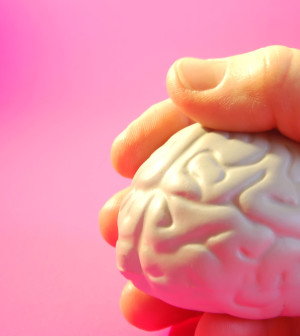- Could Your Grocery Store Meat Be Causing Recurring UTIs?
- Are You Making This Expensive Thermostat Error This Winter?
- Recognizing the Signs of Hypothyroidism
- 10 Strategies to Overcome Insomnia
- Could Artificial Sweeteners Be Aging the Brain Faster?
- Techniques for Soothing Your Nervous System
- Does the Water in Your House Smell Funny? Here’s Why
- Can a Daily Dose of Apple Cider Vinegar Actually Aid Weight Loss?
- 6 Health Beverages That Can Actually Spike Your Blood Sugar
- Treatment Options for Social Anxiety Disorder
Brain Scans Give New Clues to Chronic Pain


The causes and treatment of chronic pain are often elusive. However, a small study provides the first evidence that inflammation in key regions of the brain might play a role in ongoing discomfort.
The findings illuminate possible sources of chronic pain, and might also point the way to potential treatments, experts say.
In the study, a team led by Marco Loggia of Massachusetts General Hospital in Boston conducted brain scans of 10 people with chronic lower back pain and nine people with no pain.
Those with chronic pain had elevated levels of an inflammation-linked “translocator” protein in areas of the brain known to be involved in the transmission of pain, the study found.
“Finding increased levels of the translocator protein in regions like the thalamus — the brain’s sensory gateway for pain and other stimuli — is important,” Loggia said in a hospital news release.
That’s because whenever there’s an injurious event in the body, the protein is produced in relatively high amounts by cells called microglia and astrocytes, “the immune cells of the central nervous system,” Loggia explained.
Although much more study is needed, these early findings suggest that “these cells may be a therapeutic target” against pain, Loggia added. Tracking levels of this activity might also be a way of objectively measuring a person’s pain, he said.
The study was published online Jan. 12 in the journal Brain.
More information
The American Academy of Family Physicians has more about chronic pain.
Source: HealthDay
Copyright © 2026 HealthDay. All rights reserved.










